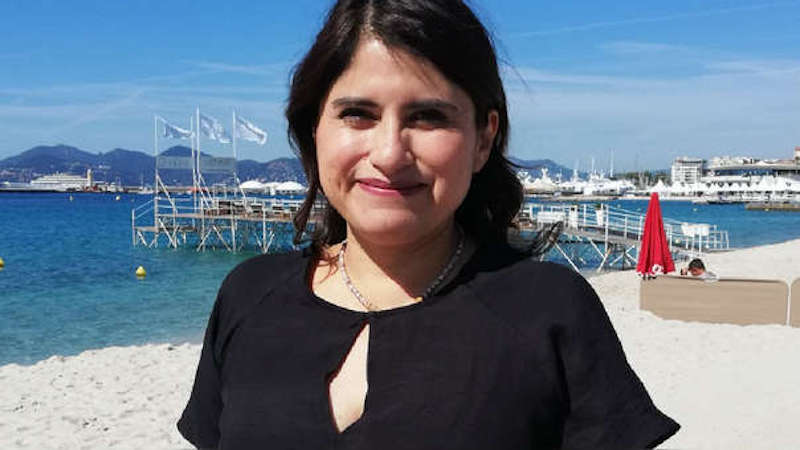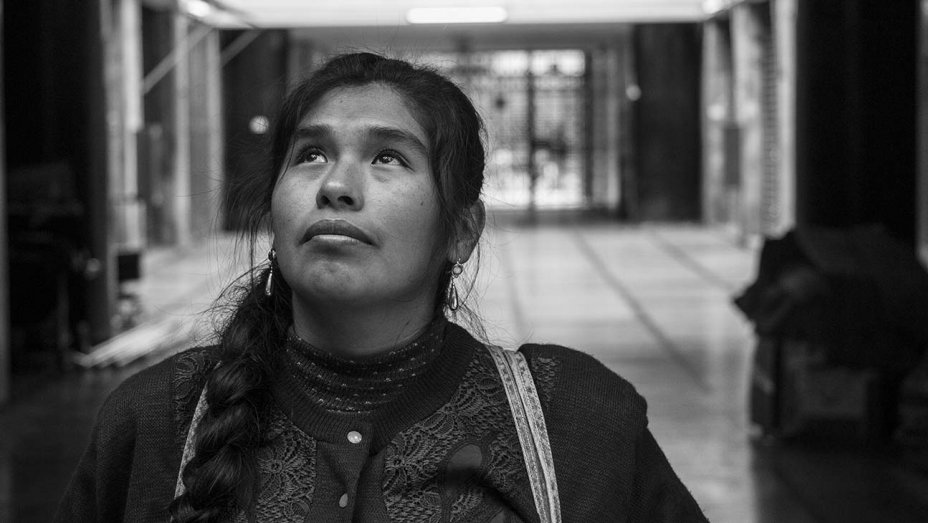The moment a woman gives birth is the most vulnerable she will ever feel in life. And in the midst of her labor pains, the overwhelming feelings of bringing a new human being into her world of uncertain future, Georgina, a young woman from the Andes, becomes the victim of the worst kind of crime inflicted on a mother. Her baby is stolen and trafficked into illegal adoption.
Georgina (the gorgeous Pamela Mendoza, who gives a haunting performance in the film) has moved to the desert outskirts of Lima in Peru to escape the violence of the Shining Path and the military fighting each other during the 1980’s political crisis gripping the country. But Georgina’s story could be the story of a woman in an African country or even in Venezuela, at the moment. As a woman, she is at best ignored and dismissed when she tries to file a claim that her child has gone missing. As an indigenous woman, she could be criminalized for her lack of papers. Fact is, those who perpetrated the crime will never be brought to justice — I’m not giving any spoilers away, we know the truth of the world — and, to paraphrase what one public official says at one point in the film, is that so bad after all? Won’t the child have a much better chance in life with a more financially stable family anyway?
The answers to those questions should never even be entertained.
The reason most of us became journalists is to change the world. Yes, even a film and fashion writer like me wants to bring cinema with a conscience and fashion which doesn’t hurt our fellow humans into the spotlight. That is my own way to change the world around me.
So, the story of the filmmaker’s father Ismael León, as retold with a lot of poetic justice by his talented offspring, is one that hit quite close to home. In the film, Pedro Campos (played with a moody, sultry beauty by Tommy Párraga) is gay, so the fight he champions with Georgina is in a way also his own fight — of repression and injustices suffered. There are references to the real man he embodies, he writes for the same newspaper La República which León’s father helped found in 1981 and he has the same bright, intelligent eyes that León’s daughter also possesses in real life.
Ultimately ‘Cancion sin nombre’ (“Song without a name”) is a hauntingly stunning film shot in perfect black and white which highlights the perils of being a human being. In a world that constantly tries to beat down our humanity, León shines a path to the truth and in the process, makes us perhaps a little bit kinder and more aware. Women like her are the reason I write.
Following is a short interview with the filmmaker in Cannes.

Is this film based on your father’s story?
Melina León: My father was a journalist, he wrote about politics all his life, he was one of the founders of the newspaper La República which is the largest newspaper in Peru. And the first headline that they used in 1981 was about trafficking of children which is what inspires the story.
Was this a story he personally worked on?
León: Yes, he wrote about it. I didn’t know this as I was growing up, I may have heard of it once or twice, it wasn’t really a topic of conversation at home. But the moment it struck me that it could be a film was when he received a phone call, 25/30 years after from a French woman that wanted to thank him because she had come back to Peru to look for her biological mother. And he learned that she was never given in adoption, she had been kidnapped. She was already a mother herself. So that pushed her to go back and meet her own mother. She had questions in her mind about “what has to happen to a woman to give up her child?” So with the newspapers and the stories she heard, she put together her own story.
In real life, this clinic was more of a daycare, so she was a baby taken from a daycare. They were not delivered. I changed it because I wanted to see giving birth.
You also changed the leading man around a bit, because I imagine he’s based on your own father, but there are things about him that make it hard to believe that he is your father…
León: Yes, exactly, everyone thinks “Oh, your father was gay?” No. This is totally fiction. I didn’t just want him to be a witness to the horrors — being rejected and discriminated against. I wanted him to know in first person what it feels like to be oppressed.
Do you think that the times are getting better in Peru nowadays, also for the indigenous population?
León: I wish I could say that, but I don’t think so. The entire world seems to be going backwards and Peru is not an exception. Our current president is substituting Pedro Pablo Kuczynski who was a right wing man that supposedly was on the honest side. He’s in jail in his home, very powerful man, educated at Oxford and this and that. And he was taking money and it was a big scandal. He’s in jail, all the presidents of the last thirty years are involved in corruption.
Is the practice of kidnapping babies also finished?
León: I also wish that was finished. When I started writing many years ago, I thought this was a particular case because of the dark years… It’s true that in the 80’s the means to do these criminal acts were easier. To fake papers.. But then I started reading more about it and found out that the trafficking of people is the number one, or number two illegal business in the world now. Not only Peru. Babies, all kinds… I understand that nowadays it’s women, young young women between say ten and twenty years old that are sold for prostitution.
You address gender equality in the film. Here is this woman, alone, fighting against the government establishment made up of men only.
León: She represents that and we chose a woman because on the scale she is in the most disadvantaged position. An indigenous man is considered invisible but a woman is worse. And a migrant peasant, she is not from the desert, she just arrived. We don’t say that in the film but many people from the Andes in those years moved to the desert because the side hit worst by the internal war were the indigenous peasants. They were between the army and the Shining Path. Both would distrust them, thinking they were collaborating with the other side. They were against history.
How difficult is it for a woman to make movies in Peru?
León: It is very difficult. In regards to getting funding, getting business people to trust you. I see so many talented women that have gone to good schools, that have show films that have played in festivals, but when it comes to funding for their first film, they never get the funding. We always take more time to get our films funded. And I see many male directors that haven’t gone to the good schools, haven’t had shorts in film festivals, haven’t proven their talent and get funded right away. How does this get explained…


